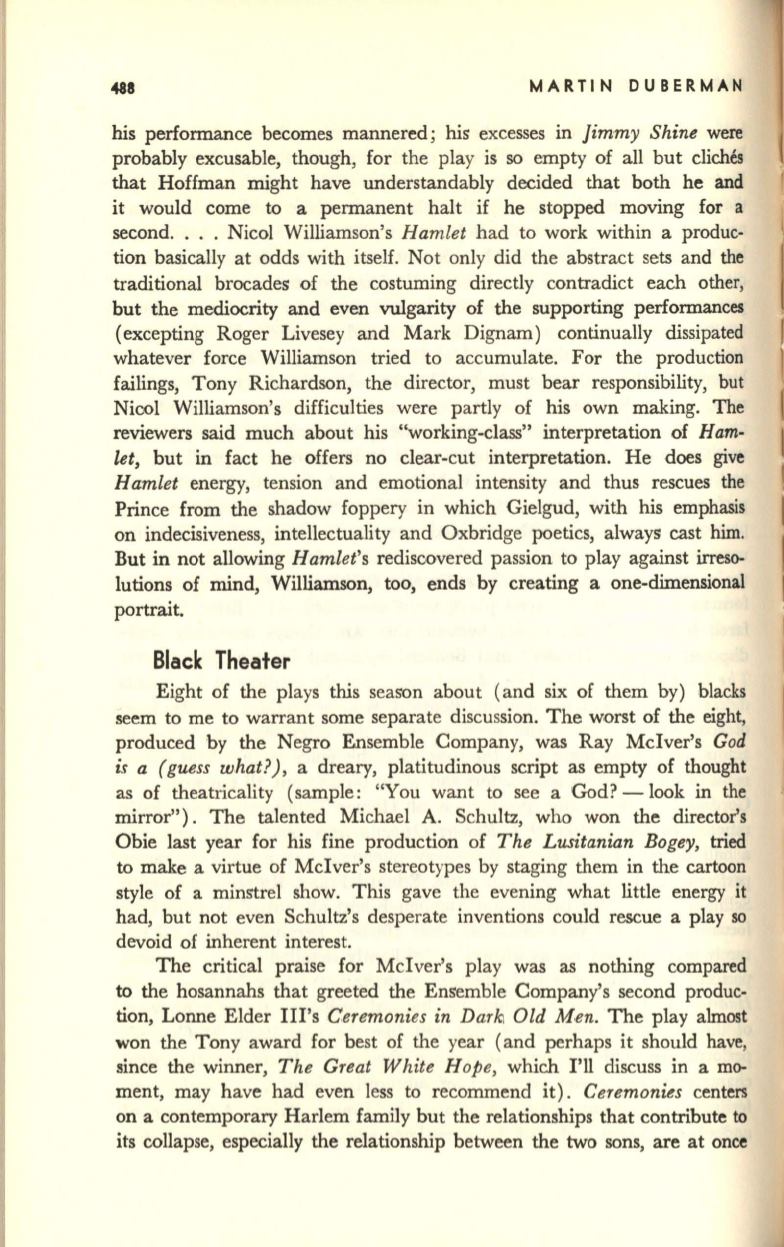
488
MARTIN DUBERMAN
his perfonnance becomes mannered; his excesses in
Jimmy Shine
were
probably excusable, though, for the play is so empty of all but cliches
that Hoffman might have understandably decided that both he and
it would come to a permanent halt if he stopped moving for a
second.... Nicol Williamson's
Hamlet
had to work within a produc–
tion basically at odds with itself. Not only did the abstract sets and the
traditional brocades of the costuming directly contradict each other,
but the mediocrity and even vulgarity of the supporting performances
(excepting Roger Livesey and Mark Dignam) continually dissipated
whatever force Williamson tried to accumulate. For the production
failings, Tony Richardson, the director, must bear responsibility, but
Nicol Williamson's difficulties were partly of his own making. The
reviewers said much about his "working-class" interpretation of
Ham–
let,
but in fact he offers no clear-cut interpretation. He does give
Hamlet
energy, tension and emotional intensity and thus rescues the
Prince from the shadow foppery in which Gielgud, with his emphasis
on indecisiveness, intellectuality and Oxbridge poetics, always cast
him.
But in not allowing
Hamlet's
rediscovered passion to play against irreso–
lutions of mind, Williamson, too, ends by creating a one-dimensional
portrait.
Black Theater
Eight of the plays this season about (and six of them by) blacks
seem to me to warrant some separate discussion. The worst of the eight,
produced by the Negro Ensemble Company, was Ray McIver's
God
is a (guess what?),
a dreary, platitudinous script as empty of thought
as of theatricality (sample: "You want to see a God? -look in the
mirror"). The talented Michael A. Schultz, who won the director's
Obie last year for his fine production of
The Lusitanian Bogey,
tried
to make a virtue of Mciver's stereotypes by staging them in the cartoon
style of a minstrel show. This gave the evening what little energy it
had, but not even Schultz's desperate inventions could rescue a play so
devoid of inherent interest.
The critical praise for Mciver's play was as nothing compared
to the hosannahs that greeted the Ensemble Company's second produc–
tion, Lonne Elder Ill's
Ceremonies in Dark, Old Men.
The play almost
won the Tony award for best of the year (and perhaps it should have,
since the winner,
The Great White Hope,
which I'll discuss in a mo–
ment, may have had even less to recommend it).
Ceremonies
centers
on a contemporary Harlem family but the relationships that contribute
to
its collapse, especially the relationship between the two sons, are at once


